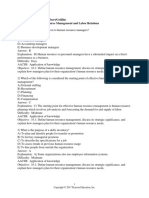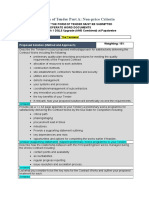Kawachi Vs Del Quero
Kawachi Vs Del Quero
Uploaded by
Camille GrandeCopyright:
Available Formats
Kawachi Vs Del Quero
Kawachi Vs Del Quero
Uploaded by
Camille GrandeOriginal Description:
Original Title
Copyright
Available Formats
Share this document
Did you find this document useful?
Is this content inappropriate?
Copyright:
Available Formats
Kawachi Vs Del Quero
Kawachi Vs Del Quero
Uploaded by
Camille GrandeCopyright:
Available Formats
Kawachi v.
Del Quero
GR No. 163768
Facts:
On August 10, 2002, petitioners scolded private respondent in front of many people about the way she
treated the customers of the pawnshop and afterwards terminated private respondent’s employment as
a pawnshop clerk. Thereafter, private respondent, in an affidavit-complaint,charged the petitioner with
illegal dismissal, non-execution of a contract of employment, violation of the minimum wage law, and
non-payment of overtime pay. The complaint was filed before the NLRC. The private respondent also
filed an action for damages against the petitioners before the MeTC.
Petitioners moved for the dismissal of the complaint on the grounds of lack of jurisdiction and forum-
shopping or splitting causes of action. At first, the MeTC granted petitioners’ motion and ordered the
dismissal of the complaint for lack of jurisdiction. Upon private respondent’s motion, the MeTC
reconsidered and set aside the order of dismissal. It ruled that no causal connection appeared between
private respondent’s cause of action and the employer-employee relations between the parties.
The RTC held that private respondent’s action for damages was based on the alleged tortuous acts
committed by her employers and did not seek any relief under the Labor Code.
Issue:
Whether the regular courts lack jurisdiction in the case at bar
Held:
Yes. The regular courts lack jurisdiction in the case at bar.
In the instant case, the allegations in private respondent’s complaint for damages show that her injury
was the offshoot of petitioners’ immediate harsh reaction as her administrative superiors to the
supposedly sloppy manner by which she had discharged her duties. Petitioners’ reaction culminated in
private respondent’s dismissal from work in the very same incident. The incident on 10 August 2002
alleged in the complaint for damages was similarly narrated in private respondent’s Affidavit-Complaint
supporting her action for illegal dismissal before the NLRC. Clearly, the alleged injury is directly related
to the employer-employee relations of the parties.
Where the employer-employee relationship is merely incidental and the cause of action proceeds from a
different source of obligation, the Court has not hesitated to uphold the jurisdiction of the regular
courts. Where the damages claimed for were based on tort, malicious prosecution, or breach of
contract, as when the claimant seeks to recover a debt from a former employee or seeks liquidated
damages in the enforcement of a prior employment contract, the jurisdiction of regular courts was
upheld. The scenario that obtains in this case is obviously different. The allegations in private
respondent’s complaint unmistakably relate to the manner of her alleged illegal dismissal.
You might also like
- Budtender Handbook - Policies and ProceduresDocument68 pagesBudtender Handbook - Policies and Proceduresapi-462683023100% (5)
- Labor Law CaseDocument4 pagesLabor Law CaseJohn Carl SowakenNo ratings yet
- Kohinoor Textile Mill LTD RawalpindiDocument40 pagesKohinoor Textile Mill LTD Rawalpindiadeelashiq04100% (2)
- C. Rules of Adminissibility - Documentary Evidence - Best Evidence Rule - Loon Vs Power Master Inc, 712 SCRADocument1 pageC. Rules of Adminissibility - Documentary Evidence - Best Evidence Rule - Loon Vs Power Master Inc, 712 SCRAJocelyn Yemyem Mantilla VelosoNo ratings yet
- Kawachi V Hon Taro Case DigestDocument3 pagesKawachi V Hon Taro Case DigestYsabel Padilla100% (1)
- TORTS DIGEST Kim vs. Phil AerialDocument1 pageTORTS DIGEST Kim vs. Phil AerialCamille GrandeNo ratings yet
- BCG Link StrategyDocument9 pagesBCG Link StrategyMuzammil Muhammad Siddiqui100% (3)
- Case Study: Chartered Qualification in Human Resource ManagementDocument12 pagesCase Study: Chartered Qualification in Human Resource ManagementYazhini Manoharan100% (1)
- LBC Vs Mateo - Case DigestDocument2 pagesLBC Vs Mateo - Case DigestNimpa PichayNo ratings yet
- Kawachi Versus Del QueroDocument2 pagesKawachi Versus Del QueroCeresjudicataNo ratings yet
- 1 Garcia vs. Bala PDFDocument2 pages1 Garcia vs. Bala PDFJames OcampoNo ratings yet
- Sunlife Assurance Company of Canada vs. Court of AppealsDocument6 pagesSunlife Assurance Company of Canada vs. Court of AppealsJaja Ordinario Quiachon-AbarcaNo ratings yet
- G.R. No. 252276. November 11, 2021Document8 pagesG.R. No. 252276. November 11, 2021Amelou Dawn CatagueNo ratings yet
- Insular v. Waterfront DavaoDocument4 pagesInsular v. Waterfront DavaoRain HofileñaNo ratings yet
- Mehitabel, Inc. vs. AlcuizarDocument2 pagesMehitabel, Inc. vs. AlcuizarRein DyNo ratings yet
- PNB vs. Phil. LeatherDocument4 pagesPNB vs. Phil. LeatherRose Ann CalanglangNo ratings yet
- JULITO SAGALES, Petitioner, Rustan'S Commercial Corporation, RespondentDocument11 pagesJULITO SAGALES, Petitioner, Rustan'S Commercial Corporation, RespondentDreiBaduaNo ratings yet
- Art. 225 CasesDocument11 pagesArt. 225 CasesIvan LuzuriagaNo ratings yet
- G.R. No. 199082 July 23, 2013 JOSE MIGUEL T. ARROYO, Petitioner, DEPARTMENT OF JUSTICE Et Al, Respondents. Peralta, J.: NatureDocument2 pagesG.R. No. 199082 July 23, 2013 JOSE MIGUEL T. ARROYO, Petitioner, DEPARTMENT OF JUSTICE Et Al, Respondents. Peralta, J.: NatureDawn Jessa GoNo ratings yet
- Kare Vs ComelecDocument1 pageKare Vs ComelectimothymarkmaderazoNo ratings yet
- 17.octavio VS PLDTDocument2 pages17.octavio VS PLDTfay garneth buscatoNo ratings yet
- FBTC v. ChuaDocument14 pagesFBTC v. ChuaiptrinidadNo ratings yet
- Holiday Inn Manila v. NLRCDocument2 pagesHoliday Inn Manila v. NLRCMekiNo ratings yet
- Mendoza v. Officers of MWEUDocument2 pagesMendoza v. Officers of MWEUFrancis PunoNo ratings yet
- Belgica Vs Ochoa G.R. No. 210503Document1 pageBelgica Vs Ochoa G.R. No. 210503John Kelly RemolazoNo ratings yet
- Marine InsuranceDocument7 pagesMarine InsuranceAngel VirayNo ratings yet
- Visayas Vs YballeDocument2 pagesVisayas Vs YballeAndrew LastrolloNo ratings yet
- Manila Cordage Company vs. The Court of Industrial RelationsDocument6 pagesManila Cordage Company vs. The Court of Industrial RelationsMichelleNo ratings yet
- Bantillo vs. Intermediate Appellate CourtDocument3 pagesBantillo vs. Intermediate Appellate CourtMaribel Nicole LopezNo ratings yet
- Labor Standards Case DigestDocument9 pagesLabor Standards Case DigestKathleen Jean ForbesNo ratings yet
- Labor DigestDocument26 pagesLabor DigestkimNo ratings yet
- BQA 2023 Short Answers PDFDocument1 pageBQA 2023 Short Answers PDFRacheal SantosNo ratings yet
- PLM Syllabus of Political ScienceDocument3 pagesPLM Syllabus of Political SciencecrisjavaNo ratings yet
- People v. BañagoDocument2 pagesPeople v. BañagojeyarelsiNo ratings yet
- ALFONSO T. YUCHENGCO vs. THE MANILA CHRONICLE PUBLISHING CORPORATIONDocument7 pagesALFONSO T. YUCHENGCO vs. THE MANILA CHRONICLE PUBLISHING CORPORATIONJacquelyn RamosNo ratings yet
- T Wu 'An Unjust Enrichment Claim For Mistaken Improvements of LandDocument22 pagesT Wu 'An Unjust Enrichment Claim For Mistaken Improvements of LandTony ZhouNo ratings yet
- Labor 6&7Document2 pagesLabor 6&7Gonzales Juliefer AnnNo ratings yet
- People of The Philippines vs. Danny GodoyDocument7 pagesPeople of The Philippines vs. Danny GodoyDales BatoctoyNo ratings yet
- 155-Univac Development, Inc. v. Soriano G.R. No. 182072 June 19, 2013Document6 pages155-Univac Development, Inc. v. Soriano G.R. No. 182072 June 19, 2013Jopan SJNo ratings yet
- Gonzales V RCBCDocument2 pagesGonzales V RCBCSheilah Mae PadallaNo ratings yet
- 250 Pentagon Steel V, CADocument2 pages250 Pentagon Steel V, CANinaNo ratings yet
- Case Digest Nos. 69 72Document6 pagesCase Digest Nos. 69 72Arthur SyNo ratings yet
- M. Ruiz Highway Transit, Inc, vs. Court of AppealsDocument5 pagesM. Ruiz Highway Transit, Inc, vs. Court of AppealsYeu GihNo ratings yet
- Filcro 2 AbesamisDocument9 pagesFilcro 2 AbesamisMaraya Lara AbesamisNo ratings yet
- Northwest Airlines vs. CA (Flores)Document2 pagesNorthwest Airlines vs. CA (Flores)Camille FloresNo ratings yet
- Assignment No 7.1Document37 pagesAssignment No 7.1rollanekimNo ratings yet
- People vs. Allingag DigestDocument2 pagesPeople vs. Allingag DigestEmir MendozaNo ratings yet
- Allado vs. DioknoDocument8 pagesAllado vs. DioknoNoo NooooNo ratings yet
- I. Law On Trademarks A. DefinitionDocument3 pagesI. Law On Trademarks A. DefinitionKellyEsperaNo ratings yet
- People vs. BeranDocument1 pagePeople vs. BeranJohn Dexter FuentesNo ratings yet
- Semblante Et Al., vs. Court of Appeals, Et Al.Document2 pagesSemblante Et Al., vs. Court of Appeals, Et Al.Marinelle Aycee Moleta PerralNo ratings yet
- Reyes Vs Maxim's Tea House Case DigestDocument1 pageReyes Vs Maxim's Tea House Case DigestKaren RonquilloNo ratings yet
- (G.R. No. 120095. August 5, 1996) : DecisionDocument9 pages(G.R. No. 120095. August 5, 1996) : DecisionellaNo ratings yet
- Divine Word University of Tacloban Vs Secretary of Labor - GR No. 91915 - September 11, 1992Document6 pagesDivine Word University of Tacloban Vs Secretary of Labor - GR No. 91915 - September 11, 1992BerniceAnneAseñas-ElmacoNo ratings yet
- Globe Mackay v. CADocument3 pagesGlobe Mackay v. CAdelayinggratificationNo ratings yet
- CASE DIGEST (Transportation Law) : Pilapil vs. CADocument1 pageCASE DIGEST (Transportation Law) : Pilapil vs. CADanica Irish RevillaNo ratings yet
- G, Upreme Qeourt: Second DivisionDocument12 pagesG, Upreme Qeourt: Second Divisionmarvinnino888No ratings yet
- Vector Shipping Vs American Home AssuranceDocument3 pagesVector Shipping Vs American Home AssuranceYodh Jamin OngNo ratings yet
- ARMANDO YRASUEGUI Vs PALDocument2 pagesARMANDO YRASUEGUI Vs PALkeziahNo ratings yet
- MARY LOU GETURBOS TORRES - Versus - CORAZON ALMA G. DE LEON G.R. No. 199440Document2 pagesMARY LOU GETURBOS TORRES - Versus - CORAZON ALMA G. DE LEON G.R. No. 199440LawiswisNo ratings yet
- Hallasgo v. COA, G.R. No. 171340, 11 September 2009Document1 pageHallasgo v. COA, G.R. No. 171340, 11 September 2009qwertyNo ratings yet
- Stat Con CasesDocument57 pagesStat Con CasesHusayn TamanoNo ratings yet
- Civpro Quick NotesDocument16 pagesCivpro Quick NotesJerry CaneNo ratings yet
- Philippine National Bank V. Gayam Pasimio, GR No. 205590, September 2, 2015, J. Velasco JRDocument1 pagePhilippine National Bank V. Gayam Pasimio, GR No. 205590, September 2, 2015, J. Velasco JRJon Hilario100% (1)
- 14 16 Case DigestsDocument8 pages14 16 Case DigestsMargate R. HenryNo ratings yet
- Julius Kawachi and Gayle Kawachi, CaseDocument4 pagesJulius Kawachi and Gayle Kawachi, Casehermione_granger10No ratings yet
- Banking Soriano Vs PeopleDocument1 pageBanking Soriano Vs PeopleCamille GrandeNo ratings yet
- Practice Court I Civil CaseDocument19 pagesPractice Court I Civil CaseCamille GrandeNo ratings yet
- Draft Guidelines For Online RevalidaDocument2 pagesDraft Guidelines For Online RevalidaCamille GrandeNo ratings yet
- Francisco Vs NLRCDocument2 pagesFrancisco Vs NLRCCamille GrandeNo ratings yet
- What Is Globalization AnywayDocument2 pagesWhat Is Globalization AnywayCamille Grande100% (3)
- LipidsDocument3 pagesLipidsCamille GrandeNo ratings yet
- Banking Bankard Vs AlarteDocument1 pageBanking Bankard Vs AlarteCamille GrandeNo ratings yet
- Ibm Vs NestleDocument2 pagesIbm Vs NestleCamille GrandeNo ratings yet
- Perpetual Help vs. FaburadaDocument1 pagePerpetual Help vs. FaburadaCamille Grande0% (1)
- Santiago Vs CF SHarp CrewDocument2 pagesSantiago Vs CF SHarp CrewTien BernabeNo ratings yet
- Diamond Farms vs. SouthernDocument2 pagesDiamond Farms vs. SouthernCamille GrandeNo ratings yet
- Yulo Vs BPIDocument1 pageYulo Vs BPICamille GrandeNo ratings yet
- Alan Limso vs. PNBDocument1 pageAlan Limso vs. PNBCamille GrandeNo ratings yet
- David Vs MacasioDocument2 pagesDavid Vs MacasioCamille Grande75% (4)
- Yulo Vs BPIDocument1 pageYulo Vs BPICamille GrandeNo ratings yet
- Begino Vs AbscbnDocument2 pagesBegino Vs AbscbnCamille Grande67% (3)
- Milan v. NLRCDocument2 pagesMilan v. NLRCCamille GrandeNo ratings yet
- Okol v. Slimmers World InternationalDocument2 pagesOkol v. Slimmers World InternationalCamille GrandeNo ratings yet
- Alan Limso vs. PNBDocument1 pageAlan Limso vs. PNBCamille GrandeNo ratings yet
- Fallarme v. San Juan de DiosDocument2 pagesFallarme v. San Juan de DiosCamille GrandeNo ratings yet
- Santos v. Servier Philippines Inc.Document2 pagesSantos v. Servier Philippines Inc.Camille Grande100% (1)
- Halaguena Vs PalDocument3 pagesHalaguena Vs PalCamille Grande100% (1)
- Torts Digest Us Vs JuanilloDocument1 pageTorts Digest Us Vs JuanilloCamille GrandeNo ratings yet
- Labor Serrano Vs GallantDocument1 pageLabor Serrano Vs GallantCamille GrandeNo ratings yet
- (G.R. No. 137798. October 4, 2000.) LUCIA R. SINGSON, Petitioner, v. CALTEX (PHILIPPINES), INC., Respondent. DecisionDocument4 pages(G.R. No. 137798. October 4, 2000.) LUCIA R. SINGSON, Petitioner, v. CALTEX (PHILIPPINES), INC., Respondent. DecisionCamille GrandeNo ratings yet
- Pdic Vs GidwaniDocument12 pagesPdic Vs GidwaniCamille GrandeNo ratings yet
- Almeda Vs CaDocument5 pagesAlmeda Vs CaCamille GrandeNo ratings yet
- Art App ReviewerDocument10 pagesArt App ReviewerCamille Grande100% (2)
- Bautista Vs PilarDocument5 pagesBautista Vs PilarCamille GrandeNo ratings yet
- Excutive SummaryDocument31 pagesExcutive SummaryyousafitajiNo ratings yet
- University of Malta University Research Ethics Committee: Check List To Be Included With UREC Proposal FormDocument19 pagesUniversity of Malta University Research Ethics Committee: Check List To Be Included With UREC Proposal FormMark VellaNo ratings yet
- Britannia Human Rights Policy Edeeff8a39Document3 pagesBritannia Human Rights Policy Edeeff8a39Suhas ghorpadeNo ratings yet
- Examining The Impact of Human Resource Management Practices On Employees' Turnover IntentionDocument16 pagesExamining The Impact of Human Resource Management Practices On Employees' Turnover IntentionJared JohnsonNo ratings yet
- Extract From The Best Advice I Ever Got by Siya MapokoDocument29 pagesExtract From The Best Advice I Ever Got by Siya MapokoSA Books50% (2)
- Arun Rawal PJ (2) 1Document78 pagesArun Rawal PJ (2) 1Arun rawalNo ratings yet
- Winning at All Costs - A Case StudyDocument33 pagesWinning at All Costs - A Case StudyJohn NixonNo ratings yet
- (Applied Econ.) Module 4. - Introduction To Applied EconomicsDocument5 pages(Applied Econ.) Module 4. - Introduction To Applied Economicsrowena marambaNo ratings yet
- Building Successful Information SystemsDocument8 pagesBuilding Successful Information Systemsririschristin_171952No ratings yet
- VIP Masterlist - 81721Document16 pagesVIP Masterlist - 81721Astra Beckett0% (1)
- Presentation of The Finding. MR LikandoDocument28 pagesPresentation of The Finding. MR LikandoJoe likandoNo ratings yet
- Skippers United Pacific Vs Doza DIGESTDocument2 pagesSkippers United Pacific Vs Doza DIGESTHarold ApostolNo ratings yet
- A STUDY OF QUALITY OF WORK LIFE IN MNCsDocument4 pagesA STUDY OF QUALITY OF WORK LIFE IN MNCskapil rastogiNo ratings yet
- Activity Hazard Analysis (AHA) : Overall Risk Assessment Code (RAC) (Use Highest Code)Document15 pagesActivity Hazard Analysis (AHA) : Overall Risk Assessment Code (RAC) (Use Highest Code)Anthony MacatangayNo ratings yet
- Applied Economics LessonsDocument15 pagesApplied Economics Lessonsنجشو گحوشNo ratings yet
- Lesson 1, 2, 3 DiscussionDocument8 pagesLesson 1, 2, 3 DiscussionIrl AlcabazaNo ratings yet
- Chapter 10Document38 pagesChapter 10distearsNo ratings yet
- Transcript of The Interview of Mr. Saqib KhatriDocument3 pagesTranscript of The Interview of Mr. Saqib KhatriShahzain RafiqNo ratings yet
- Statement of Business Principles and Code of ConductDocument20 pagesStatement of Business Principles and Code of ConductLarry LamNo ratings yet
- Rajkhan - Capstone - Saudi ArabiaDocument39 pagesRajkhan - Capstone - Saudi ArabiaLucas ToschiNo ratings yet
- Ward School Bus Case StudyDocument11 pagesWard School Bus Case StudyJeswel RebatoNo ratings yet
- Employment Contract DraftDocument3 pagesEmployment Contract DraftRachelle MagbitangNo ratings yet
- Journal Corporate Recruiting Leadership 9 08Document6 pagesJournal Corporate Recruiting Leadership 9 08Herman Legal Group, LLCNo ratings yet
- SECTION 4: Form of Tender Part A: Non-Price Criteria: Tenderer Name Proposed Solution (Method and Approach)Document4 pagesSECTION 4: Form of Tender Part A: Non-Price Criteria: Tenderer Name Proposed Solution (Method and Approach)Jessica LacaronNo ratings yet
- 002-Star Paper Corp v. Simbol, Et. Al. G.R. No. 164774, April 12, 2006Document6 pages002-Star Paper Corp v. Simbol, Et. Al. G.R. No. 164774, April 12, 2006wewNo ratings yet





















































































































